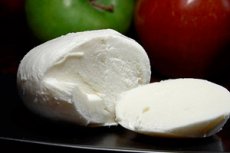
All iLive content is medically reviewed or fact checked to ensure as much factual accuracy as possible.
We have strict sourcing guidelines and only link to reputable media sites, academic research institutions and, whenever possible, medically peer reviewed studies. Note that the numbers in parentheses ([1], [2], etc.) are clickable links to these studies.
If you feel that any of our content is inaccurate, out-of-date, or otherwise questionable, please select it and press Ctrl + Enter.
Cheese in acute and chronic pancreatitis: allowed varieties
Medical expert of the article
Last reviewed: 03.07.2025

Diseases associated with the digestive organs require careful attention to your diet, choice of products and the way they are cooked. Pancreatitis is a pathology of the pancreas, an organ directly responsible for digestion. Through the pancreatic ducts, the enzymes secreted by it enter the duodenum and participate in metabolic processes: the breakdown of nutrients, the absorption of nutrients necessary for the body. Failures in this chain cause damage to the tissues of the pancreas, their death, which entails pain attacks and other unpleasant symptoms. The question of what to eat so as not to harm yourself is acute and in this context, is it possible to eat cheese with pancreatitis?
Cheese for chronic pancreatitis
Acute pancreatitis does not accept any cheeses, as well as other food products, because along with drug treatment, fasting is used. In chronic pathology of the pancreas, nutritionists even recommend low-fat cheeses due to a number of rare amino acids in their composition (methionine, lysine, tryptophan), as well as phosphatides, thanks to which the organ recovers from inflammation and fully participates in metabolism and food processing, and also provides nutrients necessary for human life.
 [ 1 ]
[ 1 ]
Cheese for cholecystitis and pancreatitis
Digestive tract malfunctions are often caused by inflammation of the gallbladder, a reservoir of bile from which it enters the duodenum for further digestion of food. Weak motility of the organ leads to its stagnation, which provokes its inflammation, and often the formation of stones. Cholecystitis and pancreatitis are mutually provoking diseases that require a special diet, which includes low-fat cheeses.
Cheese for gastritis and pancreatitis
The term "gastritis" includes numerous disorders of the stomach and it is impossible to give clear recommendations on nutrition without detailing the problems, and for this it is necessary to undergo an examination, determine its acidity and establish a diagnosis. Hard cheeses are strictly prohibited for hyperacid gastritis and pancreatitis, since organic acids and the hardness of the product can aggravate inflammation of the mucous membrane and even provoke the formation of erosions and ulcers. Young cheese of a delicate consistency, reminiscent of cottage cheese, will bring more benefit for gastritis and pancreatitis. Reduced acidity of the stomach allows this dairy product in moderate quantities, because it promotes an increase in the synthesis of gastric juice.
Benefits
When talking about the benefits of cheese, we mean, of course, a natural product. It is produced from the milk of various animals and is the main source of calcium: 100 g of it contains 1 g of the microelement, as well as other minerals, fats, proteins, carbohydrates, vitamins. Its proteins are related to human biological fluids: lymph, blood and are present in enzymes, hormones, immune bodies. Vitamin B12 plays a major role in the production of blood, B1, B2 give energy, increase performance, vitamin A improves vision. Other useful properties of cheese include strengthening the immune system, cardiovascular system, teeth, nails, hair, prevention of osteoporosis, especially in women during menopause. In terms of digestibility, cheese is significantly superior to milk. Each type of cheese is useful in its own way, depending on the method of its preparation.
Contraindications
Cheeses are contraindicated in case of intolerance to dairy products, during exacerbations of gastrointestinal tract pathologies. They are undesirable for people with high levels of low-density cholesterol, vascular atherosclerosis, peptic ulcer disease, hypertension.
 [ 9 ]
[ 9 ]
Possible risks
When eating cheeses, there is a risk of contracting listeriosis, a bacterial infection that enters the body of animals through feed in pastures. Other possible complications are related to contraindications and ignoring dietary recommendations.
 [ 10 ]
[ 10 ]

